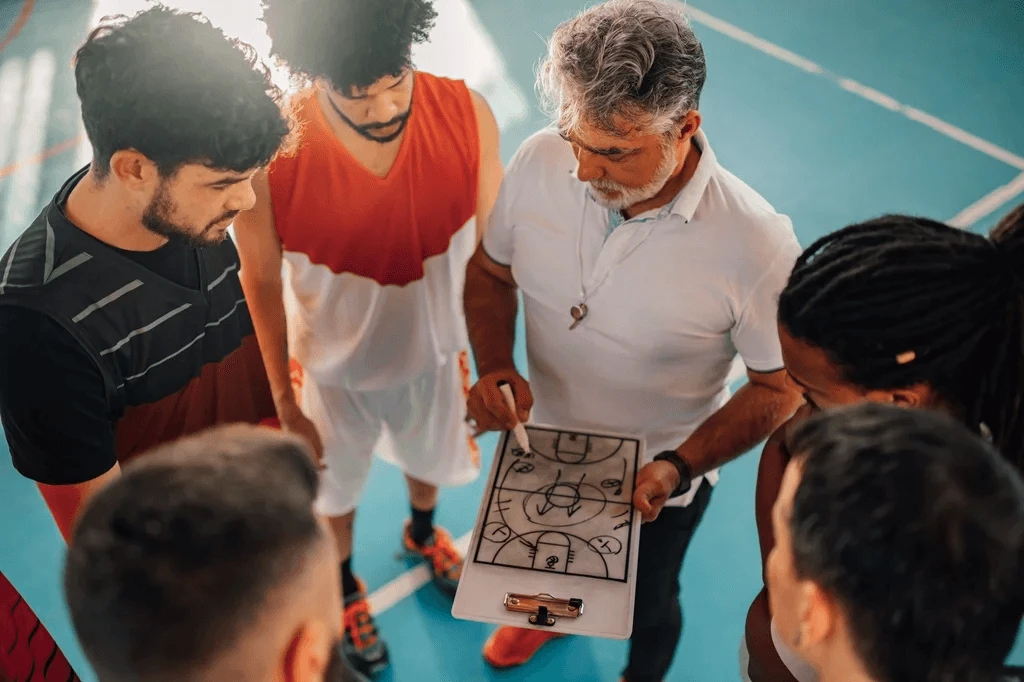Coaching is a fulfilling career where you get to train, mentor, and inspire athletes, students, or professionals to perform at their best. Whether you’re looking for coaching jobs at the high school level, aiming to be a head coach, or guiding individuals in other fields, knowing the coach job description is essential.
In this guide, you’ll discover the key responsibilities, qualifications, and must-have skills for the role. Plus, you’ll get expert insights to help you stand out in the competitive coaching field. Let’s dive in!
Job Overview
As a coach, your main job is to train, guide, and motivate individuals or teams to perform at their best. You might work in high schools, colleges, professional sports teams, or private training facilities. Depending on your role, your focus could be on improving technical skills, developing game strategies, or boosting confidence and teamwork.
Coaching jobs can be part-time or full-time, and may require working evenings and weekends, especially in sports. Your work environment will vary—you might be on the field, in a gym, or even outdoors. You’ll also collaborate with assistant coaches, trainers, and staff in the athletics department to support your team’s success.
Key Responsibilities
Your duties and responsibilities as a coach will vary based on your role and level of competition. However, most coaching jobs involve:
- Designing and implementing training programs to enhance individual and team performance
- Teaching essential techniques, strategies, and rules of the sport or activity
- Inspiring athletes and fostering a supportive, team-oriented environment
- Assessing performance and providing constructive feedback for improvement
- Managing team logistics, including scheduling practices and coordinating travel
- Prioritizing player health and safety by overseeing conditioning and injury prevention
- Communicating effectively with athletes, parents, and key stakeholders
- Supervising and mentoring assistant coaches and support staff
- Carrying out duties as assigned by the school or organization
- Identifying and recruiting talented players to strengthen the team
- Keeping up with industry trends, new training methods, and rule updates to refine coaching strategies
Educational Requirements
While some coaching jobs require only relevant coaching experience, others—especially at the high school or college level—may need formal education. Common qualifications include:
- A bachelor’s degree in physical education, sports science, or a related field
- Coaching certifications from recognized organizations
- Previous playing or coaching experience in the relevant sport or field
- CPR and first aid certification (often required for athletic coaching positions)
- For positions in academic institutions, additional teaching credentials may be required, particularly for full-time roles
- Knowledge of sports psychology to help athletes with mental preparation and performance
- Strong communication skills and leadership training to effectively manage teams and staff

Must-Have Soft Skills to Be Effective in the Role
Being a successful coach requires more than just technical expertise. Soft skills help you communicate effectively, build trust, and bring out the best in your team. Here are the key skills that will support your success in the role:
- Strong leadership skills to guide and inspire athletes toward their goals
- Excellent communication skills to clearly convey instructions and feedback
- Strategic thinking to develop effective game plans and coaching strategies
- Patience and adaptability to adjust coaching methods for different players
- Motivational skills to encourage athletes and foster a winning mindset
- Organizational skills to manage schedules, training plans, and logistics efficiently
- Conflict resolution abilities to address team disputes and maintain harmony
Why Reading the Coach Job Description Matters Before Applying
Applying for a coaching job without fully understanding the role can lead to unexpected challenges. Here’s why it’s important:
1. Understand your coaching responsibilities.
Not all coaching jobs are the same. Some focus on teaching fundamental skills, while others emphasize advanced strategy, leadership, and team development. The job description outlines your key responsibilities, such as planning training sessions, analyzing performance, motivating athletes, and handling team logistics.
2. Know the level of competition and commitment.
A high school coach may have different responsibilities than a college or professional coach. Some roles require full-time dedication, while others are part-time or seasonal. Reviewing these details ensures you understand the time commitment, practice schedule, and travel requirements.
3. Tailor your resume to highlight the right skills.
A strong coaching resume should match the job posting. If the role focuses on conditioning and skill development, emphasize your experience designing training programs. If leadership is key, highlight your ability to mentor athletes and foster teamwork.
4. Ensure you meet the certification and experience requirements.
Many coaching jobs require specific certifications, degrees, or previous coaching experience. Some schools may need a bachelor’s degree in physical education or sports science, while athletic programs might require certifications from national coaching organizations. Checking these qualifications ahead of time helps you avoid applying for jobs you’re not eligible for.
5. Prepare for coaching-specific interview questions.
The job description offers clues about what hiring managers will ask. If the role emphasizes game strategy, player development, or injury prevention, be ready to share examples of how you’ve successfully handled these aspects in past coaching roles.
6. Identify career growth opportunities.
Some coaching jobs offer chances for professional development, advanced certifications, or leadership positions. Understanding whether the position includes mentorship programs, assistant coaching pathways, or promotions can help you plan your coaching career.
7. Avoid wasting time on the wrong coaching jobs.
Reading carefully prevents you from applying for roles that don’t align with your expertise or coaching philosophy. This ensures you focus on jobs where you can truly make an impact.
How Expert Resume Writing Can Help You Land Your Dream Coaching Role
A strong resume is essential to stand out in the competitive coaching field. Many candidates have experience, but a well-crafted resume that highlights your coaching philosophy, leadership, and strategy development can set you apart.
Professional resume writers can optimize your resume with industry-specific keywords, ensuring it passes applicant tracking systems (ATS). They also know how to showcase your leadership, communication skills, and certifications in a clear, compelling way that grabs attention.
Investing in a professionally written resume can give you a competitive edge and increase your chances of landing interviews for top coaching positions. With a polished and well-structured resume, you’ll be one step closer to securing your ideal coaching job.

Secure Your Ideal Coaching Job with a Standout Resume
If you’re serious about advancing your career in coaching, having a strong resume is just as important as your coaching abilities. Whether you’re applying for a high school coaching role, a head coach position, or another opportunity, a well-structured resume can open doors.
Let the experts at Resume Professional Writers help you craft a resume that showcases your expertise, experience, and passion for coaching. Contact us today and take the next step toward your dream coaching job!








